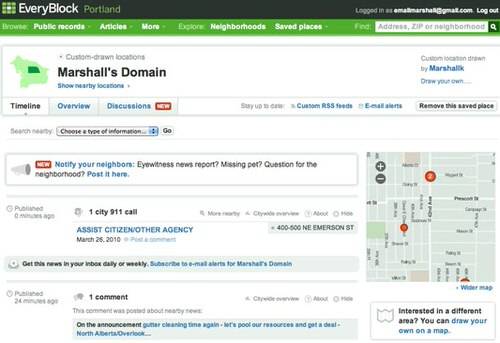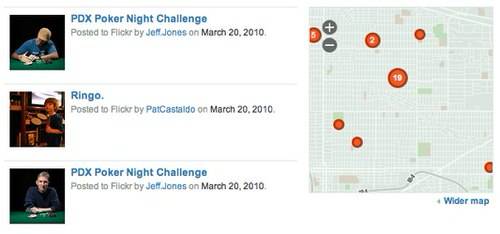A fight just broke out down the street from my house. Yesterday, a dog in my neighborhood had one of its legs amputated. That’s the kind of news I like to know and so I’m very excited that MSNBC’s hyper-local news aggregator EveryBlock has expanded this week to include services in Portland, Oregon.

EveryBlock is one of scores of competing services that serve up public records, social media content and local announcements on a neighborhood-by-neighborhood, or in this case block-by-block, basis. What does it mean when the most successful of these services rolls into your town? 12 hours into the experience, here’s what some people in the local (human) media geeks have to say about it. This conversation offers a unique view into the front-line battle to offer news consumers more and faster information about our own neighborhoods than we’ve probably ever had before.

Does existing local media consider EveryBlock a threat? Local TV news personality and new media experimenter Stephanie Stricklen doesn’t. “I can’t think of any reason why it’s not awesome,” she told us. “Any time you bring another source of information into a city, especially one where you can access info about such a small geographic perspective, I like that.”
“No matter what you think of online journalism, everything is changing and the more players that come to the table the better we are all. We serve different audiences. The local TV stations could never have the time to visit every single block every day, there’s not enough people, not even the newspaper could.”
Might local human reporters use a service like EveryBlock to find stories they should investigate and put in context? “Absolutely,” Stricklen said, “I can see myself using something like this.”
As I write this story, some kind of animal problem has been reported at an intersection near where I live and an experimental short film screening was just blogged about by a neighborhood arts organization. The films aren’t my style, to be frank, but I love that I am aware of the event.

In fact, many of the updates from public records are maddeningly unclear. Many others are so trivial that lots of readers wouldn’t consider them news. The health department visited the Chinese restaurant down the street and found the ice-scooper stuck handle-side down in the ice machine! Some lady on Yelp said she didn’t like the tapas restaurant. Someone just flagged down a police car, but EveryBlock has no idea what it was about. To this EveryBlock’s Dan O’Neil says: “Are there gaps in EveryBlock’s knowledge? Yes. Are there gaps in human knowledge in real life? Yes! There’s a comment field, help us out!” Is this a newswire of completed stories? No, this is something different. (But it is a complete publishing of the public records your taxpayer funded agencies make available, O’Neil points out.)
To be honest, I like reading that kind of stuff. Maybe you do too. As O’Neil says, “we do have a wider definition of what news is.” Not everyone feels satisfied with the level of detail being provided or the absence of filtering the signal from the noise. It’s hard to imagine machines replacing the human storytelling that journalists provide. The machines could augment that journalism, though, and there’s lots of room for them to do an even better job of it.
Where Humans and Machine Work Together
EveryBlock founder Adrian Holovaty told us in January that the organization had hired a full-time editor to research various government agency codes in order to articulate public records in a more human-readable way. “It’s one thing to publish public records; it’s another to make sense of them,” he said.
EveryBlock’s O’Neil told us that editor’s name is Paul Wilson and said Paul put in hours interviewing Portland municipal staff in order to translate the data fields the city publishes into the format EveryBlock now publishes. O’Neil says those municipal staff members are unsung heroes, especially Rick Nixon of the Bureau of Technology Services.
“It’s a very complex endeavor to publish regularly updated data,” O’Neil says.
“Portland has excellent meta data and contact info, but a lot of times it’s hard to get to the expertise and for those experts to explain it to someone else. When it’s not your job to answer phone calls from web developers and tell them what spreadsheets mean, it’s tough. We’re in a weird gap time. In the future the expectations and questions we bring to data will be more common and it will be a part of peoples’ job descriptions – but the people in Portland should be commended for already really trying to figure out what these things mean.”
Portland makes a lot of this data officially available as part of its brand-new CivicApps program, but EveryBlock worked with the county restaurant inspection agency to get that data in particular through other channels. “We’re cycling through 5,000 restaurants on a nightly basis,” O’Neil says, “and the restaurant inspections in Portland are the most plain language content of all the cities we look at. It’s great to see those people speaking in human and not just municipal language.”
Home-Team Geeks
“What will be really exciting is to see what Portland’s indigenous community of developers and web journos do with the content the city is making available,” says Steve Suo, editor and executive VP of Portland’s real-time, white-label EveryBlock competitor NozzlMedia. Nozzl is made up of long-time newspaper guys, now building something for the future. (See our write up of Nozzl: “Welcome to the Age of Robot Reporters“.) EveryBlock’s arrival in town happened just days after the city’s celebrated opening of a substantial amount of new data through CivicApps, and with help from the city. Nozzl thinks it can do a better job of putting this data into context. “The more eyes you have on the data, the more insights we’ll see brought to bear,” Suo says.
“We’re currently adding all the same Portland data for our Portland metro news customers,” Nozzl co-founder and CEO Steve Woodward says. Woodward says that in addition to prioritizing context and serving white-label customers, Nozzl pulls from more sources of data, covers a broader geographic area, and focuses on real-time data. “EveryBlock will tell you what crimes occurred near your home over the last several days. Nozzl will give you information about that siren you hear at this very moment.”
EveryBlock’s O’Neil basically says bring it on, pointing to Portland’s mere five minute delay on 911 call data and his site’s real-time bulletin feature.
These are remarkable times. There are services like EveryBlock, Nozzl, Outside.in, Fwix and more all battling it out to best serve us users with new and innovative ways to drill down into more details about our immediate physical surroundings.
EveryBlock is the biggest player in the game, though, and our awareness of hyper-local news here in tech-savvy Portland has probably been changed for good.

















